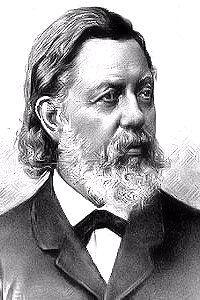Introduction

Born: October 6, 1827, Wuppertal-Cronenberg, Germany.
Died: June 3, 1888, Leipzig, Germany.

Born: October 6, 1827, Wuppertal-Cronenberg, Germany.
Died: June 3, 1888, Leipzig, Germany.
Son of a pharmacist, Reidel is remembered as a choral conductor and composer.
Though always musically inclined, he was originally trained for business, and was in the silk trade in Lyons until 1848, when he decided to make music his profession.
He returned home and began serious study under the direction of Karl Wilhelm, later known as author of Die Wacht am Rhein.
Late in 1849, Riedel entered the Leipzig Conservatorium, where he made great progress under Moscheles, Moritz Hauptmann, Becker and Plaidy.
Riedel practiced and performed in a private society at Leipzig Astorga’s Stabat, Palestrina’s Improperia and Leo’s Miserere.
This led him to found a singing society of his own, which began on May 17, 1854, with a simple quartet of male voices, and was the foundation of the famous association which, under the name of the Riedelsche Verein, became celebrated in Leipzig.
The first public concert was in November 1855, and its first great achievement was a performance of Bach’s B Minor Mass on April 10, 1859.
Among works performed by the group were Beethoven’s Mass in D, Kiel’s Christus, Berlioz’ Messe des Morts, and Liszt’s Graner Messe and St. Elizabeth.
Riedel was one of the founders of the Beethovenstiftung, and an earnest supporter of the Wagner performances at Bayreuth in 1876.
Riedel’s own compositions were mostly part-songs for male voices, but he edited several ancient works by Praetorius, Franck, Johann Eccard and other old German writers.